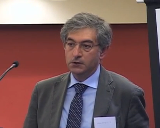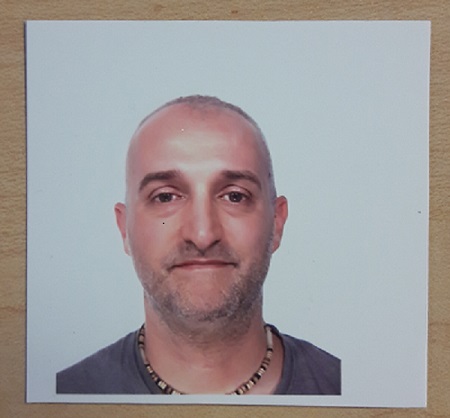Studying at the University of Verona
Here you can find information on the organisational aspects of the Programme, lecture timetables, learning activities and useful contact details for your time at the University, from enrolment to graduation.
Academic calendar
The academic calendar shows the deadlines and scheduled events that are relevant to students, teaching and technical-administrative staff of the University. Public holidays and University closures are also indicated. The academic year normally begins on 1 October each year and ends on 30 September of the following year.
Course calendar
The Academic Calendar sets out the degree programme lecture and exam timetables, as well as the relevant university closure dates..
| Period | From | To |
|---|---|---|
| Sem. 1A | Sep 23, 2019 | Oct 31, 2019 |
| Sem. 1B | Nov 11, 2019 | Jan 11, 2020 |
| Sem. 2A | Feb 17, 2020 | Mar 28, 2020 |
| Sem. 2B | Apr 6, 2020 | May 30, 2020 |
| Session | From | To |
|---|---|---|
| Sessione d'esame invernale | Jan 13, 2020 | Feb 15, 2020 |
| Sessione d'esame estiva | Jun 3, 2020 | Jul 25, 2020 |
| Sessione d'esame autunnale | Aug 24, 2020 | Sep 19, 2020 |
| Session | From | To |
|---|---|---|
| Sessione di laurea estiva | Jul 6, 2020 | Jul 11, 2020 |
| Sessione di laurea autunnale - Servizio Sociale | Nov 6, 2020 | Nov 6, 2020 |
| Sessione di laurea invernale | Apr 7, 2021 | Apr 13, 2021 |
| Period | From | To |
|---|---|---|
| Festa di Ognissanti | Nov 1, 2019 | Nov 1, 2019 |
| Chiusura Ateneo | Nov 2, 2019 | Nov 2, 2019 |
| Festa dell'Immacolata | Dec 8, 2019 | Dec 8, 2019 |
| Vacanze di Natale | Dec 23, 2019 | Jan 6, 2020 |
| Vacanze di Pasqua | Apr 10, 2020 | Apr 14, 2020 |
| Festa della liberazione | Apr 25, 2020 | Apr 25, 2020 |
| Festa del lavoro | May 1, 2020 | May 1, 2020 |
| Sospensione delle lezioni | May 2, 2020 | May 2, 2020 |
| Festa del Santo Patrono | May 21, 2020 | May 21, 2020 |
| Sospensione delle lezioni | May 22, 2020 | May 23, 2020 |
| Festa della Repubblica | Jun 2, 2020 | Jun 2, 2020 |
| Vacanze estive | Aug 10, 2020 | Aug 15, 2020 |
Exam calendar
Exam dates and rounds are managed by the relevant Humanistic Studies Teaching and Student Services Unit.
To view all the exam sessions available, please use the Exam dashboard on ESSE3.
If you forgot your login details or have problems logging in, please contact the relevant IT HelpDesk, or check the login details recovery web page.
Should you have any doubts or questions, please check the Enrollment FAQs
Academic staff
 gaia.cetrano@univr.it
gaia.cetrano@univr.it
 giorgia.decarli@univr.it
giorgia.decarli@univr.it
 annamaria.giarola@univr.it
annamaria.giarola@univr.it
 antonio.nocera@univr.it
antonio.nocera@univr.it
 luciano.pasqualotto@univr.it
luciano.pasqualotto@univr.it
 antonella.salvan@univr.it
antonella.salvan@univr.it
 carlo.soregotti@univr.it
carlo.soregotti@univr.it
 giorgio.zoccatelli@univr.it
giorgio.zoccatelli@univr.it
Study Plan
The Study Plan includes all modules, teaching and learning activities that each student will need to undertake during their time at the University.
Please select your Study Plan based on your enrollment year.
1° Year
| Modules | Credits | TAF | SSD |
|---|
2° Year activated in the A.Y. 2020/2021
| Modules | Credits | TAF | SSD |
|---|
3° Year activated in the A.Y. 2021/2022
| Modules | Credits | TAF | SSD |
|---|
| Modules | Credits | TAF | SSD |
|---|
| Modules | Credits | TAF | SSD |
|---|
| Modules | Credits | TAF | SSD |
|---|
Legend | Type of training activity (TTA)
TAF (Type of Educational Activity) All courses and activities are classified into different types of educational activities, indicated by a letter.
Communication and cultural mediation (2021/2022)
Teaching code
4S000599
Teacher
Coordinator
Credits
6
Language
Italian
Scientific Disciplinary Sector (SSD)
M-PED/04 - EDUCATIONAL RESEARCH
Period
Sem. 2A dal Feb 14, 2022 al Mar 26, 2022.
Learning outcomes
Knowledge and understanding - Knowledge and understanding of the principles concerning the listening attitude - Knowledge and understanding of the empathic relationship Ability to apply knowledge and understanding - Ability to develop a collaborative and constructive relationship both with the user and the other professional roles involved in the helping processes. SPECIFIC OBJECTIVES At the end of the course, students will have acquired knowledge of the epistemological foundations of intercultural communication; will be familiar with the principal models of intercultural communicative competence; will be aware of the existence of different cultural models; and will be familiar with cultural shock methods. Moreover the course will provide students with the skills necessary to detect the assumptions and values at the base of the different cultural models and of the different communicative styles, and will transfer to them the ability to employ the critical incident technique as both a tool for the analysis of case studies, and as a tool in interventions.
Program
COURSE PROGRAMME
Summary of course contents:
1. The multicultural global society
- Promoting inclusion and democracy: an intercultural outlook
2. An intercultural approach: the Cohen Emerique method.
- Critical incidents: a training methodology for developing an intercultural approach.
- Obstacles to understanding the other
- The other's frame of reference
- Communication styles
3. Intercultural mediation
- The concept of mediation
- Cultural vs. intercultural mediation
- Conflict resolution
- Instruments for cultural mediation
Teaching methods and learning settings
In additional to traditional lectures, the course is based on workshop-type activities, in particular:
a) showing video/film sequences, with accompanying discussion and analysis.
b) reading passages from autobiographical and narrative texts by experts in intercultural competence and/or authors from a migrant or non-Western background.
c) critical incidents, with accounts provided by social work professionals.
d) analyzing interviews carried out with social work professionals who work in areas characterized by dense migrant populations.
Course requirements
- familiarity with the concept of competence
- familiarity with the main concepts that underpin the intercultural approach
- a grounding in the basic principles of human communication.
BIBLIOGRAPHY
M. Cohen-Emerique , Per un approccio interculturale nelle professioni sociali e educative Dagli inquadramenti teorici alle modalità operative. Erickson, Trento, 2017
Lecture notes
The content of the text used during the course and that of the lectures and class exercises will follow the program outlined here. Additional learning materials will be available on the course e-learning platform.
Bibliography
Examination Methods
ASSESSMENT:
Scope of assessment
Students will be required to demonstrate:
1) familiarity with the basic principles of the intercultural approach.
2) familiarity with the fundamental principles of intercultural communication (ICC) and mediation.
3) the ability to analyze the critical incidents and experiences recounted/collected via the interviews from an intercultural perspective, demonstrating that they have fully assimilated this form of inquiry and learning.
4) the ability to formulate lines of reasoning in a concise, academically rigorous, and syntactically accurate manner, not least by identifying the essential elements that emerge in relation to the themes and issues under consideration.
Nature of the assessment and material covered:
The assessment of learning outcomes:
- An individual written report, which – taking as its starting point the critical incidents presented in class - should critically analyse them using, as appropriate, the concepts, theoretical models and interventions covered during the course (i.e. cultural frames, relational modes, critical nodes, required competencies, etc. relating to encounters between people from different cultural backgrounds).
Assessment criteria
The assessment result will be expressed as a score out of a possible thirty marks
Marks will be awarded on the basis of the following performance criteria:
The micro-study must provide clear evidence of learning:
-command of specialist terminology pertaining to the sector in question;
- by analyzing and discussing the critical incidents presented in class;
- by citing the texts indicated in the bibliography and other texts identified during the research process,
- by providing a personal interpretation of, and reflection on, the lessons attended bibliographical sources.
- demonstration of personal reflection on the material studied and the ability to reconcile theory and practice;
- correct grammar and syntax.
Instructions for drafting the report*
The data analysis process should be supported by references to the texts covered during the course (and to other works and studies known to the student or students). The length of the report is to be decided by the student or students themselves. The recommended minimum length, however, is 5 pages (each of 3,000 characters) plus the bibliography and appendices (which should include a complete transcription of the data collected through questionnaires, interviews, ethnographic journals, etc.).
The report should include:
- a cover (with full names and matriculation numbers of the student or students, the name of the degree course, the project title, and a contact email address and telephone number;
- an abstract/brief summary of the project;
- introduction;
- data analysis;
- discussion of the analysis and any critical incidents identified;
- conclusion;
- bibliography
- appendices: all data collected via questionnaires, ethnographic journals and interviews, and journal articles used as references in the analysis and discussion on the chosen themes.
The text should be subdivided into paragraphs and supplemented, in a proper academic fashion, by footnotes and final bibliography.
The report must be submitted by email to the course leader at least five days prior to the exam date selected by the student.
Type D and Type F activities
Modules not yet included
Career prospects
Module/Programme news
News for students
There you will find information, resources and services useful during your time at the University (Student’s exam record, your study plan on ESSE3, Distance Learning courses, university email account, office forms, administrative procedures, etc.). You can log into MyUnivr with your GIA login details: only in this way will you be able to receive notification of all the notices from your teachers and your secretariat via email and soon also via the Univr app.
Student mentoring
Linguistic training CLA
Gestione carriere
Practical information for students
Documents
| Title | Info File |
|---|---|
|
|
pdf, it, 325 KB, 02/05/23 |
|
|
pdf, it, 212 KB, 02/05/23 |
|
|
pdf, it, 131 KB, 02/05/23 |
Graduation
Documents
| Title | Info File |
|---|---|
|
|
pdf, it, 99 KB, 13/10/23 |
|
|
pdf, it, 101 KB, 10/04/24 |
List of theses and work experience proposals
| theses proposals | Research area |
|---|---|
| Proposta tesi | Various topics |
Assistente Sociale
Comune e Università di Verona collaborano per la formazione alla professione di assistente sociale.
Professione Assistente Sociale
Pagina aggiornata il 18/1/2022
Stage e Tirocini
Le attività̀ di tirocinio degli studenti si svolgono presso strutture esterne, convenzionate con l’Università degli Studi di Verona ai sensi delle vigenti disposizioni in materia. Nelle strutture esterne gli studenti svolgono le attività di tirocinio sotto la responsabilità di un assistente sociale (Tutor-supervisore), appartenente a dette strutture, coordinato a sua volta dal responsabile del tirocinio presso il Corso di Studio.
In assenza di un assistente sociale, operante nella struttura esterna, il Collegio didattico, per quanto di competenza, decide, su proposta dei responsabili del tirocinio, in ordine alle condizioni per l’effettuazione o la prosecuzione delle attività di tirocinio degli studenti interessati. Le attività di tirocinio sono obbligatorie per almeno 450 ore.
Il Collegio didattico, in deroga alle disposizioni del presente articolo, può consentire a studenti che si trovino in particolari condizioni, in specie se disabili, lavoratori o impegnati in organismi collegiali dell’Università degli Studi di Verona, di non ottemperare in parte all’obbligo di frequenza alle attività di tirocinio, predisponendo forme alternative di tirocinio, anche tramite supporti telematici e multimediali interattivi.
I responsabili delle attività di tirocinio presso il Corso di Studio, anche avvalendosi di appositi collaboratori o tutori esterni, accertano la presenza degli studenti presso le rispettive strutture. A tal fine utilizzano un apposito libretto di frequenza per ciascuno studente.
Al termine dell’attività di tirocinio, lo studente deve presentare una relazione scritta al responsabile di tale attività presso il Corso di Studio. Lo studente elabora la relazione scritta, controfirmata dal Tutor-supervisore. La relazione finale viene valutata dal responsabile del tirocinio presso il Corso di Studio e deve tenere conto degli obiettivi prefissati dal Collegio didattico.
La valutazione viene attribuita al tirocinio nel seguente modo: sufficiente = 1; buono = 2; ottimo = 3; eccellente = 4 e verrà aggiunta alla media dei voti del curriculum al momento della discussione della tesi.
Gli Uffici della Direzione Didattica e Servizi agli Studenti predispongono la documentazione necessaria allo svolgimento delle attività̀ di tirocinio, comprese attestazioni e certificazioni.
Nel caso in cui lo studente partecipi a programmi di mobilità internazionale, le attività̀ di tirocinio vengono regolamentate come segue:
A – Lo studente svolge il Tirocinio presso la sede estera.
Se lo studente svolge il Tirocinio all’estero si ritengono assolti gli obbligo relativi al Laboratorio se:
- - lo studente aggiorna il proprio docente/tutor con brevi relazioni mensili da inviare mezzo mail, sull’andamento del lavoro svolto presso la sede estera;
- - produce una relazione finale completa del tirocinio svolto.
La valutazione finale del laboratorio di guida al tirocinio sarà̀ effettuata da parte del tutor del laboratorio sulla base della relazione dello studente tenendo conto della eventuale valutazione da parte del supervisore estero.
B – Lo studente non svolge il Tirocinio presso la sede estera.
Se lo studente non svolge il Tirocinio nella sede estera e lo deve fare al rientro:
lo studente effettua uno/due incontri individuali iniziali con il docente/tutor in cui predisporre quanto necessita per l’avvio del tirocinio e nei quali verranno forniti materiali, griglie ed eventuali testi di riferimento;
invia brevi relazioni mensili sull’andamento del tirocinio che sarà svolto in Italia al di fuori del periodo in cui si tiene il laboratorio di guida al tirocinio;
produce la relazione finale completa del tirocinio svolto”.
- Tutte le informazioni in merito agli stage per futuri studenti sono disponibili alla pagina Stage e tirocini.
- Tutte le informazioni in merito agli stage per studenti iscritti sono pubblicate in MyUnivr - come fare per - stage e tirocini.
- Tutte le informazioni in merito agli stage per le aziende sono disponili alla pagina Stage e tirocini per azienze.

 045 8124930
045 8124930




























